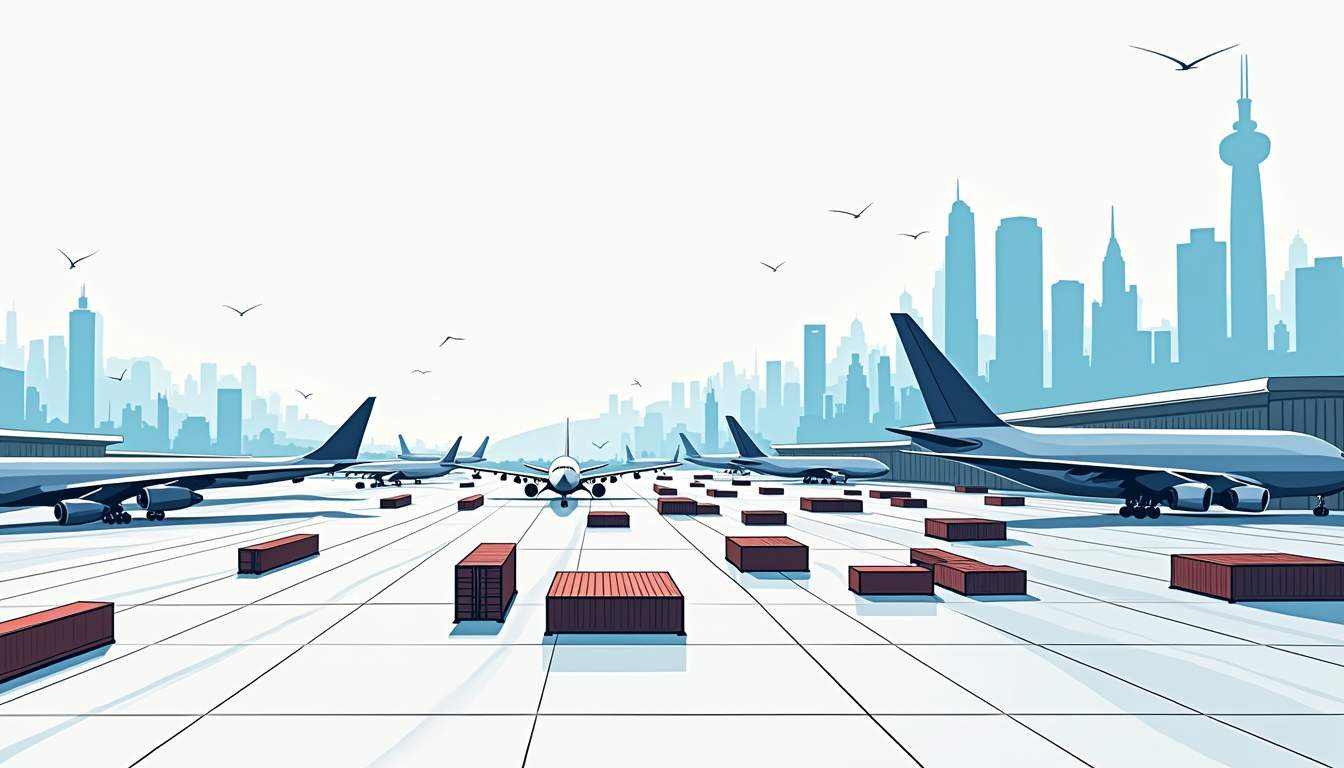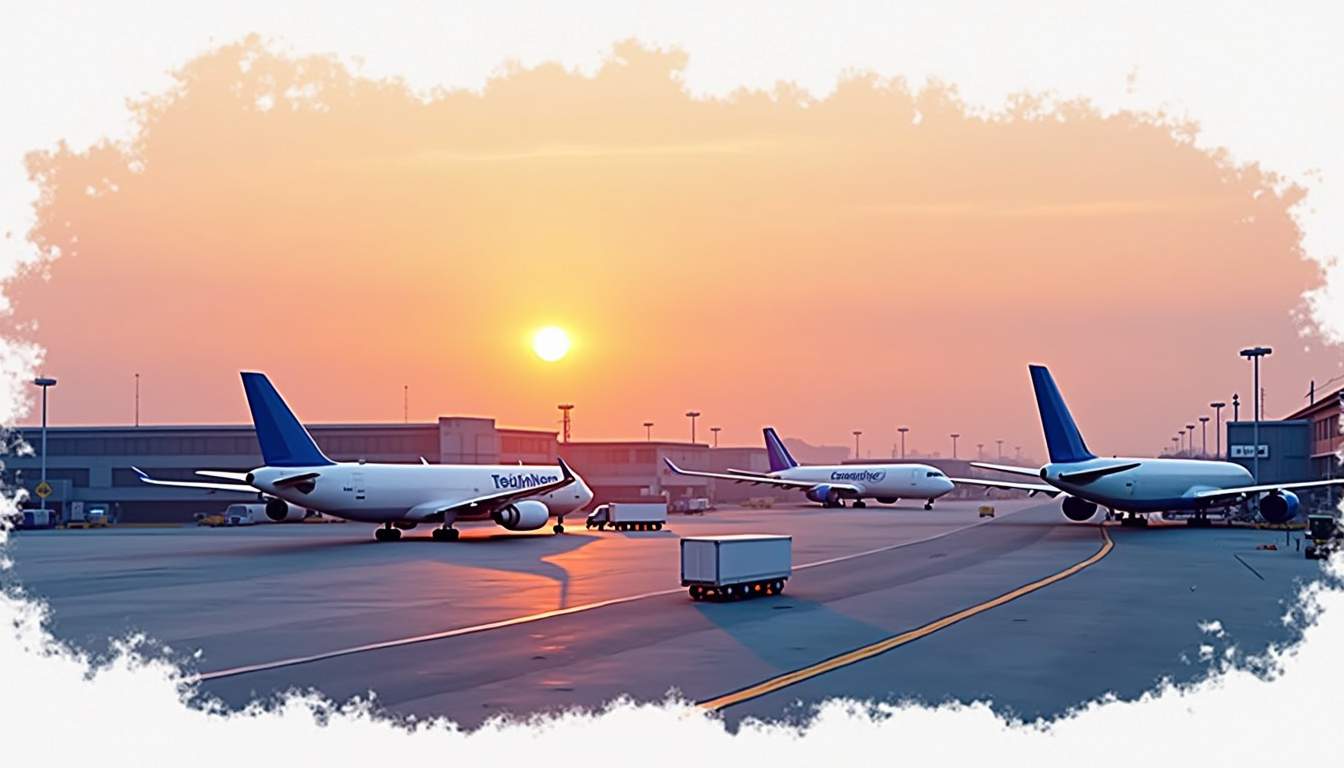The air cargo market in the United States has experienced significant transformations in recent years, driven by various factors such as e-commerce growth, technological advancements, and shifting consumer preferences. As we look ahead to 2025, understanding the trends and predictions in the air cargo sector becomes crucial for stakeholders, including logistics companies, airlines, and policymakers. This article delves into the anticipated changes in the air cargo market, highlighting key trends and offering insights into what the future may hold.
Current Landscape of the Air Cargo Market
Before diving into future predictions, it is essential to grasp the current state of the air cargo market in the USA. The air freight industry has rebounded from the challenges posed by the COVID-19 pandemic, with demand surging due to increased online shopping and global supply chain disruptions.

Growth Driven by E-Commerce
One of the most significant drivers of air cargo growth is the booming e-commerce sector. With consumers increasingly opting for online shopping, the demand for rapid delivery services has skyrocketed. Major retailers and logistics companies are investing heavily in air freight capabilities to meet customer expectations for fast shipping.
This trend is expected to continue, with projections indicating that e-commerce sales will keep rising, further fueling the need for efficient air cargo solutions. Companies that can adapt to this demand will likely thrive in the evolving market landscape. Additionally, the rise of same-day and next-day delivery options has prompted logistics providers to optimize their networks, often leading to the establishment of new distribution centers strategically located near major urban areas. This not only enhances delivery speed but also reduces transportation costs, creating a more sustainable model for air cargo operations.
Technological Advancements in Air Cargo
Another critical factor shaping the air cargo market is the rapid advancement of technology. Innovations such as automated sorting systems, drones, and real-time tracking solutions are revolutionizing the logistics industry. These technologies enhance operational efficiency and improve the overall customer experience.
As technology continues to evolve, air cargo companies are expected to adopt more sophisticated systems to streamline operations, reduce costs, and enhance service delivery. This shift will be pivotal in maintaining competitiveness in a fast-paced market. Moreover, the integration of artificial intelligence and machine learning into logistics operations is enabling companies to predict demand more accurately, optimize routes, and manage inventory levels effectively. Such advancements not only improve operational efficiency but also contribute to better environmental sustainability by minimizing waste and reducing carbon footprints associated with air freight transportation.
Key Trends Influencing the Air Cargo Market by 2025
Several trends are anticipated to shape the air cargo market in the coming years. Understanding these trends will help stakeholders make informed decisions and adapt their strategies accordingly.
Sustainability and Environmental Concerns
As environmental awareness grows, sustainability is becoming a crucial factor in the air cargo industry. Companies are under increasing pressure to reduce their carbon footprints and adopt greener practices. This shift is prompting airlines and logistics providers to explore alternative fuels, invest in fuel-efficient aircraft, and implement more sustainable operational practices.
By 2025, it is expected that sustainability will not only be a regulatory requirement but also a competitive advantage. Companies that prioritize eco-friendly practices will likely attract environmentally conscious consumers and partners, positioning themselves favorably in the market. Furthermore, the adoption of advanced technologies such as artificial intelligence and big data analytics will enable companies to optimize their logistics processes, reducing waste and enhancing efficiency. As a result, the industry may see a rise in the development of carbon-neutral cargo solutions, which could redefine standards for environmental responsibility in air transport.
Increased Competition and Market Consolidation
The air cargo sector is witnessing a wave of mergers and acquisitions as companies seek to enhance their market presence and operational capabilities. This trend is likely to continue, with larger players acquiring smaller firms to expand their networks and service offerings.
As competition intensifies, companies will need to differentiate themselves through innovative solutions, exceptional service quality, and strategic partnerships. Those that can effectively navigate this competitive landscape will be better positioned for success in 2025 and beyond. Additionally, the rise of e-commerce is driving demand for faster delivery services, compelling air cargo companies to innovate their logistics frameworks. This shift not only encourages technological advancements but also fosters collaboration between air freight providers and tech companies, leading to the creation of more integrated supply chain solutions that meet the evolving expectations of consumers.
Global Trade Dynamics
The air cargo market is intricately linked to global trade dynamics. Changes in trade policies, geopolitical tensions, and economic conditions can significantly impact air freight demand. As the USA navigates its trade relationships with other nations, the air cargo sector will need to adapt to these external factors.
By 2025, it is anticipated that trade agreements and international relations will continue to evolve, influencing air cargo volumes. Companies that remain agile and responsive to these changes will be more resilient in facing market fluctuations. Moreover, the ongoing digital transformation in global trade, characterized by the rise of blockchain technology and digital platforms, is expected to enhance transparency and efficiency in air cargo operations. This technological shift will facilitate smoother customs processes and reduce delays, ultimately benefiting stakeholders across the supply chain. As businesses adapt to these innovations, the air cargo market will likely experience a fundamental shift in how goods are transported internationally, leading to new opportunities and challenges for industry players.
Predictions for the Air Cargo Market in 2025
With the current trends in mind, several predictions can be made regarding the air cargo market in the USA by 2025. These forecasts provide valuable insights for stakeholders looking to navigate the future landscape.
Increased Demand for Time-Sensitive Deliveries
The demand for time-sensitive deliveries is expected to rise significantly by 2025. As consumers become accustomed to rapid shipping options, businesses will increasingly rely on air cargo to meet these expectations. This trend will be particularly pronounced in sectors such as pharmaceuticals, perishables, and high-value goods, where timely delivery is critical.
Airlines and logistics companies that can offer reliable and efficient time-sensitive services will likely capture a larger share of the market. Investments in infrastructure and technology will be essential to support this growing demand.
Expansion of Regional Air Cargo Hubs
To accommodate the increasing volume of air cargo, there will likely be an expansion of regional air cargo hubs across the USA. These hubs will serve as critical nodes in the logistics network, facilitating faster and more efficient distribution of goods.
Strategically located hubs will enable airlines to optimize their routes and reduce transit times, ultimately benefiting both businesses and consumers. This development will also create new opportunities for regional economies, as increased cargo activity can lead to job creation and infrastructure improvements.
Enhanced Focus on Supply Chain Resilience
The disruptions caused by the COVID-19 pandemic have highlighted the importance of supply chain resilience. By 2025, companies in the air cargo sector will likely prioritize building more robust and flexible supply chains to withstand future shocks.
This focus on resilience may involve diversifying suppliers, investing in technology for better visibility and tracking, and adopting contingency plans for potential disruptions. Companies that successfully enhance their supply chain resilience will be better equipped to navigate uncertainties in the market.
Challenges Facing the Air Cargo Market
While the future of the air cargo market appears promising, several challenges must be addressed to ensure sustainable growth. Recognizing these challenges is essential for stakeholders aiming to thrive in a competitive environment.

Regulatory Compliance and Security Concerns
As the air cargo industry evolves, regulatory compliance and security concerns will remain paramount. Airlines and logistics providers must navigate a complex landscape of regulations related to safety, security, and environmental standards.
Failure to comply with these regulations can result in significant penalties and reputational damage. Therefore, companies must invest in compliance programs and stay informed about changing regulations to mitigate risks effectively.
Capacity Constraints and Infrastructure Limitations
Capacity constraints and infrastructure limitations pose significant challenges to the air cargo market. As demand continues to grow, airports and cargo facilities may struggle to keep pace, leading to congestion and delays.
To address these issues, investments in infrastructure development and modernization will be crucial. Public-private partnerships can play a vital role in enhancing airport facilities and expanding cargo handling capabilities, ensuring that the industry can meet future demand.
Workforce Shortages and Training Needs
The air cargo sector is not immune to workforce shortages, which can impact operational efficiency and service quality. As the industry evolves, there will be a growing need for skilled professionals who can navigate new technologies and processes.
To address this challenge, companies must invest in training and development programs to equip their workforce with the necessary skills. Collaborations with educational institutions can also help create a pipeline of talent for the future.
Conclusion
The air cargo market in the USA is poised for significant growth and transformation by 2025. Driven by e-commerce expansion, technological advancements, and evolving consumer preferences, the industry will face both opportunities and challenges in the coming years.

Stakeholders must remain vigilant and adaptable, embracing sustainability, innovation, and resilience to navigate the changing landscape. By understanding the key trends and predictions outlined in this article, companies can position themselves for success in the dynamic air cargo market of the future.
As the air cargo sector continues to evolve, collaboration among industry players, government agencies, and educational institutions will be essential. Together, they can foster an environment that supports growth, innovation, and sustainability, ensuring that the air cargo market remains a vital component of the global economy.
Partner with Freighter Gator for Your Air Cargo Needs
As the air cargo landscape evolves towards 2025, aligning with a trusted partner like Freighter Gator can ensure your business stays ahead of the curve. With our commitment to fast, flexible, and reliable air cargo charter solutions, we’re equipped to meet the increasing demand for time-sensitive deliveries. Whether you’re shipping emergency parts or oversized equipment, our global expertise guarantees your cargo’s punctual arrival. Ready to elevate your logistics strategy? Request a quote today and experience the peace of mind that comes with working with Freighter Gator.
